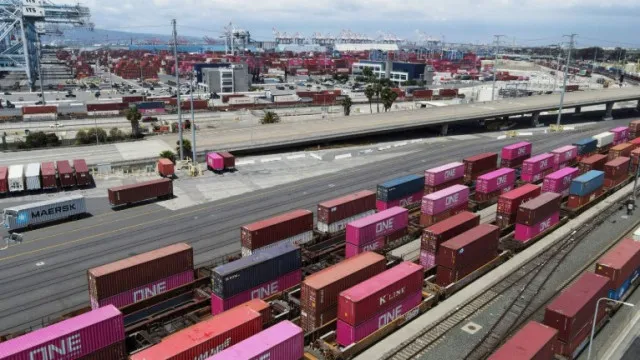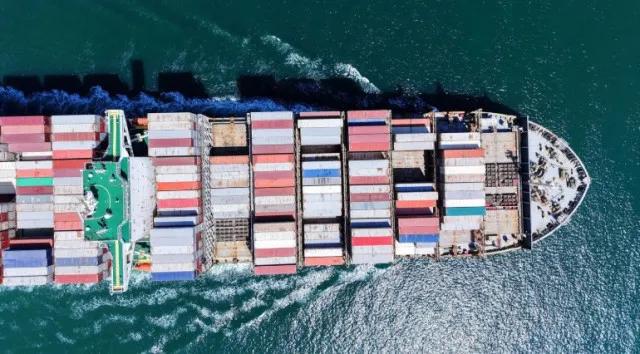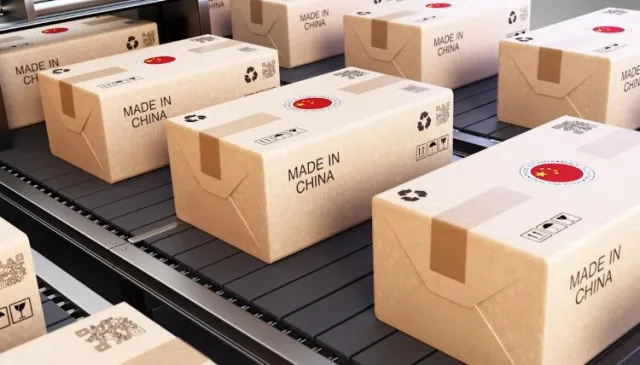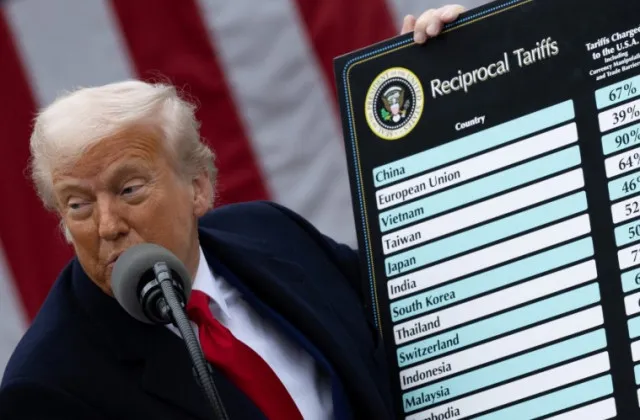The first Chinese shipments facing 145% tariffs arrive in LA, with cargo volume halved, raising concerns about upcoming product shortages.
American consumers are facing tough choices as the first boats carrying goods from China arrive in Los Angeles.
These shipments are now subject to high tariffs imposed by the U.S. government.
This situation is a direct result of the ongoing trade war initiated by President Donald Trump.
Impact of Trump’s tariffs on imports
The ships arriving at U.S. ports are the first to carry goods affected by the recent increase in tariffs, which have risen to 145% on most Chinese imports.
As a result, imports from China have dropped significantly.

Gene Seroka, the executive director of the Port of Los Angeles, reported that cargo volume is down about 35% compared to last year.
“This week, we’re down about 35% compared to the same time last year, and these cargo ships coming in are the first ones to be attached to the tariffs that were levied against China and other locations last month,” Gene Seroka said.
The current arrivals show a decline of over 50% in imports.
Many importers are canceling orders because they are unwilling to pay the high tariffs.
This steep cost can more than double the price of products from China, making them less appealing to U.S. businesses.
Many shipments have been canceled for June.
The Port of Los Angeles was expecting 80 ships to arrive in May, but 20% of those have been canceled.
Additionally, 13 sailings have already been canceled for June.

This drop in shipments raises concerns about the future availability of goods for consumers.
Seroka warned that the situation is uncertain, and prices for products have already increased significantly.
“And you still don’t know how long this is going to last,” Seroka warned.
“Retailers and importers alike are telling me that the products now cost about two and a half times more than they did just last month.”
Retailers opt to store goods in warehouses.
In response to the tariffs, some retailers are opting to store their products in Chinese warehouses rather than importing them.
It is cheaper for them to keep goods in China than to pay the tariffs.

Ryan Petersen, CEO of Flexport, stated that this could lead to a 60% decline in deliveries to the U.S. Consumers will soon begin to notice these changes.
Petersen explained that a 60% reduction in containers means much less merchandise will arrive in the country.
As existing stock runs out, shortages are expected to occur, leading to price increases.
Predictions for future import trends
According to the National Retail Federation, imports into the U.S. are expected to decline by at least 20% year over year in the second half of 2025.
The decrease from China may be even more significant, with JP Morgan predicting a drop of 75% to 80% in imports from that country.
Currently, Americans are purchasing goods that have already been stored in U.S. warehouses.
However, these stockpiles are dwindling, and if the situation continues, retailers will run out of inventory.

Petersen warned that by summertime, shoppers could face shortages and empty shelves.
“If this goes on for a few more weeks, (retailers will) sell through that inventory and by the summertime, you’ll have shortages and empty shelves,” Petersen said.
While Seroka does not expect completely empty shelves, he anticipates that consumers will experience a reduced selection of products.
For example, if someone is looking for a specific type of pants, they may find many options but not the one they want.
The available items are likely to be priced higher than usual.
Stockpiling by businesses is coming to an end.
In March, stockpiling by businesses contributed to an unexpected widening of the U.S. trade deficit, which reached a record $140.5 billion.
Companies rushed to order materials and goods ahead of the new tariffs.
Economist Daniel Vielhaber noted that businesses had been preparing for the tariffs but now face challenges as the new costs take effect.
Despite the recent surge in imports, economists believe that the influx will continue for a few more weeks.
Some shipments may arrive duty-free if they reach U.S. ports before May 27.